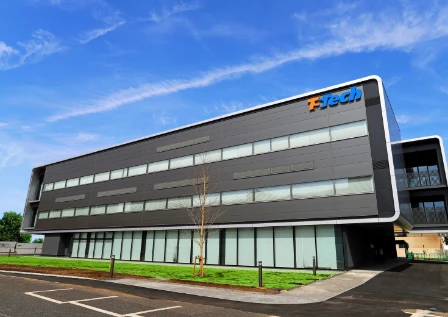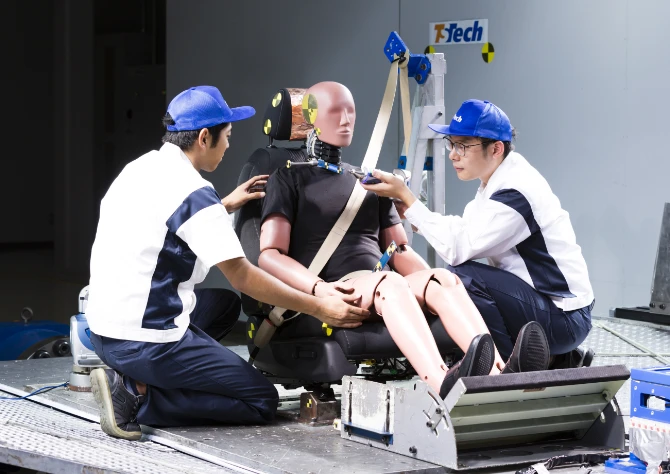Special Feature: Audit and Supervisory Committee Roundtable Discussion
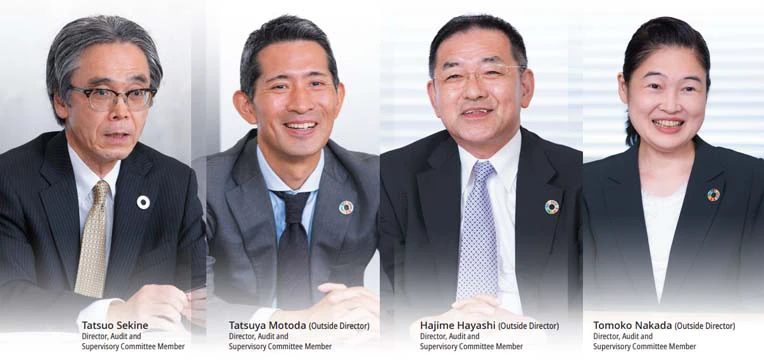
Driving Corporate Evolution through ESG Management That Draws Upon a Diverse Array of Knowledge
Along with the transition to a “company with an Audit and Supervisory Committee” corporate governance structure in June 2021, TS TECH also established the voluntary Nomination and Compensation Committee, thereby forming a system that ensures that the objective opinions of outside directors are more readily reflected in corporate management than before. We invited the four members of the new Audit and Supervisory Committee to a roundtable discussion to discuss the new corporate governance system, which is designed to achieve more transparent, impartial corporate management, and to share their aspirations for the future.
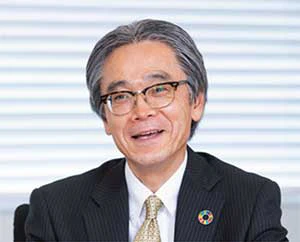
Tatsuo Sekine
Director, Audit and Supervisory Committee Member
- Apr. 1982
- Joined TS TECH
- Apr. 2004
- Accounting Department, Administration Division, General Manager, TS TECH
- Apr. 2010
- Operating Officer, Business Supervision Division Deputy Executive General Manager, TS TECH
- Apr. 2011
- Operating Officer, Corporate Business Administrative Division Deputy Executive General Manager, TS TECH
- Apr. 2017
- Managing Officer, Corporate Managerial Planning Office General Manager, TS TECH
- Apr. 2020
- Managing Officer, TS TECH
- June. 2020
- Auditor, TS TECH
- June 2021
- Director, TS TECH (Audit and Supervisory Committee Member) (current)
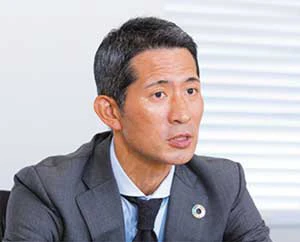
Tatsuya Motoda
(Outside Director)
Director, Audit and Supervisory Committee Member
- May 1993
- Joined Anderson Consulting (now Accenture Japan Ltd.)
- Sept. 1999
- Joined Tsuji CPA Accounting Office (now Hongo Tsuji Tax & Consulting)
- Apr. 2007
- International Tax Affairs Department General Manager, Tsuji CPA Accounting Office
- Oct. 2008
- Registered as a tax accountant
- Apr. 2014
- Representative tax accountant, Motoda Tax & Accounting Office (current)
- June 2014
- Auditor, TS TECH
- July 2018
- Outside Auditor, Global Information, Inc. (current)
- June 2021
- Director, TS TECH (Audit and Supervisory Committee Member) (current)
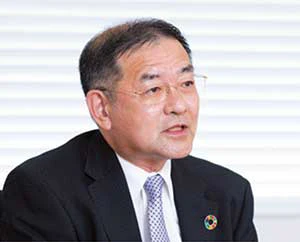
Hajime Hayashi
(Outside Director)
Director, Audit and Supervisory Committee Member
- Apr. 1983
- Joined Mie Labor Management Center
- Apr. 1986
- Registered as an attorney
Joined Owaki & Sumi Law Office
- Apr. 1989
- Joined Meiwa Law Office
- May 1996
- Representative, Sazanka Law Office (current)
- June 2020
- Auditor, TS TECH
- June 2021
- Director, TS TECH (Audit and Supervisory Committee Member) (current)
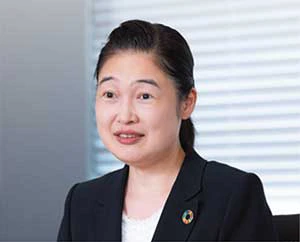
Tomoko Nakada
(Outside Director)
Director, Audit and Supervisory Committee Member
- Apr. 1997
- Appointed as an Assistant Judge (Tokyo District Court)
- June 2000
- Registered as an attorney (affiliated with Dai-ni Tokyo Bar Association)
- Aug. 2002
- Admitted to the New York State Bar Association
- Mar. 2015
- Elected as an International Fellow of the American College of Trust and Estate Counsel (current)
- Apr. 2017
- Elected as an Academician of the International Academy of Estate and Trust Law (current)
- Dec. 2020
- Representative, Tokyo Heritage Law Firm (current)
- June 2021
- Director, TS TECH (Audit and Supervisory Committee Member) (current)
Assessing the Board of Directors
- Sekine:
-
The TS TECH Board of Directors is currently in the process of becoming a more effective body. Since fiscal 2021, the meetings have been chaired by an outside director, and this has led to more objective proceedings and more active discussions than in the past.
The content of the meeting reports and discussions is also starting to involve higher-level management decisions. With the transition to a “company with an Audit and Supervisory Committee” structure, the Board of Directors has delegated an increasing number of business decisions to directors, which I feel has improved the quality of the institution.
- Motoda:
-
Adopting a “company with an Audit and Supervisory Committee” structure has not only increased the percentage and number of outside directors at TS TECH, I believe it has also made it easier for each of the outside directors to participate in Board proceedings. Directors receive detailed materials on matters to be reported or resolved at the Board of Directors’ meetings, and detailed supplementary explanations are also provided for technical terms that are difficult for those outside the company to understand.
- Hayashi:
-
I agree with Mr. Motoda. I very much appreciate the thorough briefings on agenda items that we receive before these meetings. We are briefed in detail on agenda items for the Audit and Supervisory Committee meetings, which are held in advance of the Board of Directors’ meetings, so this allows us to be fully prepared when the Board meets.
I am also very impressed with the Board meetings. That is, each agenda item is well focused on the salient points. Looking at any of the items, it is clear that each has been fully discussed before being brought to the Board of Directors. This approach means we waste no time, and the Board meetings are, I believe, conducted in an efficient, productive manner.
- Nakada:
-
Having only recently been appointed, I have only attended a few meetings, but I was initially surprised to see how everyone, both internal and outside directors alike, actively participated. I feel that discussions at every meeting are very lively.
Employees waste no time giving their reports, speaking in a well-organized manner and presenting carefully prepared materials. Seeing this, my impression is that TS TECH operations are firmly underpinned by a group of talented people.
A New Corporate Governance Structure
- Sekine:
-
In addition to the Audit and Supervisory Committee, the company also established the voluntary Nomination and Compensation Committee in June 2021 to increase transparency and fairness by incorporating the independent perspectives of outside directors in management decisions. The primary purpose of transitioning from a “company with a Board of Auditors” structure to a “company with an Audit and Supervisory Committee” structure was to further strengthen its supervisory function. Although we will largely perform the same duties as the auditors from the previous structure, such as reviewing the execution of duties by directors and preparing audit reports, the auditing methods will change significantly. The previous structure was based on individual auditing, in which each member has the right to examine company business reports and review operations and assets as a single-person entity. The Audit and Supervisory Committee, on the other hand, is based on organizational auditing, which involves cooperation between the internal audit departments and departments in charge of internal control. TS TECH will place the Corporate Business Audit Department under the direct control of the Audit and Supervisory Committee and take other measures to strengthen lines of reporting in order to ensure that organizational auditing is both efficient and effective.
- Motoda:
-
As an advisory body to the Board of Directors, the Nomination and Compensation Committee, which I chair, consults with the Board of Directors and reports to the Board on matters related to the appointment and dismissal of directors and executive officers, as well as compensation and other issues. There were, of course, criteria in place before for selecting director and executive officer candidates, as well as for determining compensation. However, these matters were decided based on deliberations among top management, which made it difficult, I think, for those on the outside to understand the process. Under the new structure, the committee, made up of a majority of outside directors, operates under the kind of objective, transparent, and fair system required of a global company. This, I believe, will further enhance TS TECH’s corporate governance structure.
- Sekine:
-
The Audit and Supervisory Committee and the Nomination and Compensation Committee are both new to TS TECH, so for these committees to fulfill their auditing and monitoring functions as expected, we must resolve a number of issues as we move forward.
With regard to the Audit and Supervisory Committee, I am the only full-time member, so in order to effectively conduct direct audits (involving visits to subsidiaries), we must work with the Corporate Business Audit Department, which is now under the committee’s control as a result of organizational layout changes, and overseas corporate business audit departments to establish auditing procedures. It is the responsibility of the Nomination and Compensation Committee to establish the most appropriate procedures for the recommendation of appointments and remuneration for directors as well as for the expression of those recommendations.
Diversity on the Board of Directors
- Sekine:
-
One advantage of a diverse Board of Directors is the ability to make decisions not bound by convention. Internal directors who have built their careers entirely inside the company tend to have trouble looking critically at proposals presented at Board meetings because of their familiarity with the trajectory of previous operations as well as the corporate culture. I believe that the presence of outside directors who are able to speak from an independent perspective increases the Board’s diversity, which leads to more objective and creative discussions when making decisions.
- Motoda:
-
I agree. The Group is making great strides toward achieving its 2030 vision goal of becoming “a seat and interior system supplier that is trusted worldwide.” To achieve this, new values need to be the driving force. If you look at TS TECH Group companies outside Japan, however, most of the management positions are still filled by employees posted from Japan. The goal for the future should be to have director and executive officer positions held by people from the countries in which these Group companies operate. The entire Group, not just TS TECH, needs to be involved with this matter.
At TS TECH, Ms. Nakada became the first woman appointed to the Board of Directors in June 2021, further increasing the Board’s diversity. Going forward, I hope that more women who are building careers inside the company will help lead the Group to growth by serving in executive positions.
- Nakada:
-
For many women, there are phases in their careers when childbirth and child-rearing inevitably take time from work. It is therefore vital to create an environment that supports women who are raising children. I respect the top management’s commitment to actively work to create an environment that makes it easy for anyone, regardless of gender, to work by expanding internal systems such as childcare leave and reduced working hours. I am very much in favor of this corporate policy.
- Hayashi:
-
It would be great if the efforts to promote women’s careers led to more women appointed as directors, following in Ms. Nakada’s footsteps. However, diversity is not simply a matter of gender, nationality, or age. Diversity in management experience will be especially important for the Board of Directors moving forward. Japan’s Corporate Governance Code, which was revised in June 2021, also calls for appointing independent outside directors with management experience at other companies in its “Preconditions for Board and Kansayaku Board Effectiveness” principle. There are currently outside directors with management experience in other areas of the manufacturing industry on the Board, but adding directors with management experience in a wider range of industries should be considered in the future.
Further Enhancing Corporate Value
- Sekine:
-
The TS TECH Group has focused on a number of initiatives in line with the management policy articulated in the 13th Medium-Term Management Plan (fiscal 2018–fiscal 2020), the “Creation of a foundation for ESG management,” as well as the policy in its 14th Medium-Term Management Plan (fiscal 2021–fiscal 2023), “Corporate evolution through ESG management.” Over this period, the Group has worked to strengthen ESG management using the Dow Jones Sustainability Indices (DJSI), international standards for measuring corporate sustainability, as its benchmark. There have not, however, been any significant changes to the organizational layout which supports the “G” for “governance” in ESG. However, as the revisions to the Corporate Governance Code and the restructuring of the Tokyo Stock Exchange stock market (to a prime market) demonstrate, demand is now strong for highly transparent, impartial corporate governance systems.
With the transition to a “company with an Audit and Supervisory Committee” structure and the establishment of the voluntary Nomination and Compensation Committee, the time has come to test the true value of TS TECH’s corporate evolution through ESG management. It is crucial that we not be satisfied with merely changing the organizational layout but that we continue to promote efforts centering on the social and environmental domains in order to enhance corporate value through ESG management.
- Motoda:
-
Indeed. ESG management leads to higher stock values and otherwise enhances corporate value. Of the three ESG components, the “E” for “environmental” looks to become increasingly important. The number of natural disasters caused by global warming-driven climate change is increasing, and governments are now imposing stricter industrial regulations to protect the environment. As a global company and manufacturer involved in the automotive industry, the Group must further accelerate its efforts to protect the environment. Proactive investment is required to ensure that business activities have less impact on the global environment, utilizing means such as the use of raw materials with a low environmental impact, the establishment of manufacturing methods with lower CO2 emissions, and an expanded use of renewable energy.
- Hayashi:
-
I am also keenly aware of how important the environment is. However, as someone who specializes in legal affairs and compliance, I strongly believe that we must take care of people, as well as the environment and natural world. The first goal of the SDGs is to end poverty. This is a focus that goes hand in hand with valuing people. As a group that operates in many different countries, TS TECH should be keenly aware of issues that affect people worldwide, the most symbolic being poverty, as it conducts its business activities. I believe that increased corporate value comes from thinking not only of the Group but of the entire supply chain, and addressing the Group’s responsibilities at each step along the way.
Aspirations as Audit and Supervisory Committee Members
- Hayashi:
-
Having been promoted from auditor to director, it is both an honor and a privilege to have become a member of the “management team” with voting rights on the Board of Directors.
Under the management policy of “Corporate evolution through ESG management,” the Group has established priority measures from both proactive and protective angles. “Evolution for business growth” is the proactive angle, and “stronger business operations structure to support evolution” is the protective angle. As a specialist in the legal field, I will take responsibility for “protection” by scrutinizing each aspect of Group growth and exercising my voting rights at the Board of Directors meetings from a “protective” viewpoint.
- Nakada:
-
This is my first experience serving as an outside director. I have heard that simply having a woman on the top management team of the company is very encouraging for the female employees, so I will do my best to inspire everyone.
I also recognize that my role is to offer suggestions from a legal perspective as an attorney, as well as opinions from both a global perspective that incorporates my experience outside Japan and a woman’s perspective. I will contribute to the company’s development by offering ideas that other directors may not have considered.
- Motoda:
-
As chair of the Nomination and Compensation Committee, my goal is to run the newly established committee as a highly effective organization to ensure that is it more than a mere formality.
I recognize that it is very difficult for outside directors such as ourselves who are not full-time members to properly evaluate candidates for director or executive officer positions based only on a limited amount of data and interviews. This is why I will work closely with our full-time director and the executive officers to ensure that we are able to identify the personal qualities and qualifications of the talent who will become the next generation of leadership at TS TECH.
- Sekine:
-
Now that I am a member of the Audit and Supervisory Committee, I am responsible for carrying out more in-depth auditing duties.
Previously, I mainly performed audits from a legality standpoint to determine whether directors were in compliance with laws, regulations, and the Articles of Incorporation in the execution of their duties. Now, however, I will also be responsible for audits from a validity standpoint to determine the rationality of the decision-making process and the business activities being executed.
In addition, as a director with voting rights at Board of Directors’ meetings, I will be involved in the process of making decisions regarding the execution of business matters, and I am looking forward to assuming these new responsibilities.
As a full-time Audit and Supervisory Committee member, I will also play a role in making sure the other outside directors on the committee have sufficient information, working with them and playing a supervisory role to support sustainable growth at TS TECH.


